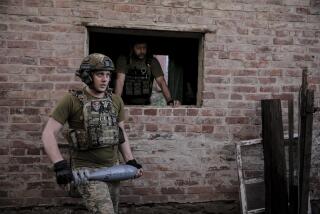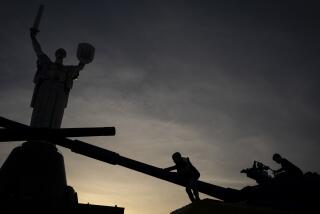Kurds Take Aim at Larger Goal: Democracy for All of Iraq : Mideast: A leader of the minority group is headed for Washington to press the cause of political change.
SHAQLAWA, Iraq — The political position of the Kurds, the roughly 3.5 million non-Arab people who inhabit most of northern Iraq, has improved markedly in the months since many Kurds fled from Iraqi troops and won the sympathy of the world through their ordeal in the mountains.
For almost four months, Kurdish leaders have been in negotiation with Saddam Hussein for an agreement that would formally give them local government powers. And public pronouncements, at least, make prospects for those negotiations sound better all the time.
In a speech this week, Hussein himself made a point of extolling “autonomy for our Kurdish people” in the larger context of what he called a “new phase of pluralism” that would allow a political voice to the many ethnic and religious groups among Iraq’s 17 million people.
Nonetheless, no agreement has been signed. Kurdish leaders joke that the agreement will come “in three days, or three months, or three years. . . .”
And so the Kurds are now turning to the United States for political help. Barham Salih, an official of the Kurdish political front here, has just embarked for Washington to become part of a permanent delegation working with the State Department on programs to “encourage the democratization of Iraq.”
Salih, an aide to top Kurdish political leader Jalal Talabani, says it is not incongruous to talk of democracy while Iraqi soldiers set up checkpoints every few miles along the country’s main roads and Kurdish guerrillas, cradling Kalashnikov rifles, sit around the lobby of the Tourist Hotel in this mountain retreat 250 miles northeast of Baghdad.
Rather, he says that pressures on Iraq are creating a climate for change. “Economic sanctions won’t be lifted unless Iraq moves toward democracy,” Salih said, “and I believe that even members of the ruling Baath Party see that one-party rule, or one-man rule, cannot continue here.”
Salih, an engineer who recently returned to Iraq after 12 years in Britain, said the Kurdish leadership has just proposed to President Hussein that the Kurds would postpone their demand for local autonomy in return for progress toward democracy in all of Iraq--by which he means “a parliamentary system allowing peaceful transfer of power.”
The Kurds are not calling for Hussein to leave power, Salih insists. “Let’s not personalize it. We don’t want one man to go and be replaced by another dictator,” he said.
“We want true democracy, which in simple terms means the army cannot take you for interrogation without a proper warrant from a judge.”
Iraq’s Kurds are few in number compared to the Kurdish populations of neighboring Turkey and Iran. There are also sizable Kurdish communities in the Soviet Union and Syria.
Right now those international connections are helping the Kurds in Iraq to withstand the country’s economic troubles. Food and financial support are coming from Turkey and Iran.
And the same Baghdad government that for years drove Kurdish farmers out of their villages, say Kurdish officials, is now urging the farmers back to the fields to help alleviate food shortages. The mountainous green fields of the north, with hay crops just harvested and sheep grazing, are a contrast to Iraq’s vast desert.
Baghdad is seeking Kurdish help in other ways, too. In Arbil, the city of 750,000 that is the capital of the Kurdish region, Iraqi police are asking the cooperation of Kurdish guerrillas, known as peshmerga, to keep the peace. “For the moment, the police need the peshmerga, “ explains a Kurdish official. “They are incapable of dealing with our people and, obviously, it is in our interest to see that law and order is preserved.”
In the Kurdish region, police and the Iraqi army ignore the destruction and defacement of Hussein’s portraits in public places.
But things are not that good for the Kurds. There are an estimated half a million Kurdish refugees on the Iranian border, officials here say. And two weeks ago in Arbil, 3,000 people demonstrated, demanding information about loved ones missing since Iraqi attacks on Kurdish villages in 1988. “I am trying to verify the figure,” Salih said, “but it could be that 180,000 people are missing.”
In the face of such horrors, the Kurds are adamant that international economic sanctions be maintained on Iraq. “If they could get the money from the oil, within six months they would not need us, and Kurdish autonomy would be a worthless fiction,” said Ahmed Karadaghi, a young Kurdish officer.
Even with sanctions, some Kurds believe there will be no change in Iraq. “The attitude of the ruling party is that they think they can ride out the storm,” said an official of the Kurdish leadership who asked to remain anonymous. “The calculation is that they can survive by satisfying the Republican Guards (the core of the Iraqi military) and large numbers of their well-armed security apparatus--and to hell with the rest of the Iraqi people.”
“How to counter that?” asked Barham Salih just before he left for Washington. “Work for democracy, and for that we will need U.S. and allied help.”
The Kurds are not overly confident of U.S. support. They remember the helicopters that U.S. forces allowed the Iraqi army to keep flying after the Gulf War. “I was fighting in Kirkuk, and those helicopters beat the hell out of us,” said Karadaghi.
“The United States had a chance to create a new Middle East and missed the opportunity,” said Salih, expressing a view heard widely in this region. But then he adds, “Or maybe it is not missed yet.”
The last four months, and the world’s sympathy, have given the Kurds hope.
More to Read
Sign up for Essential California
The most important California stories and recommendations in your inbox every morning.
You may occasionally receive promotional content from the Los Angeles Times.









